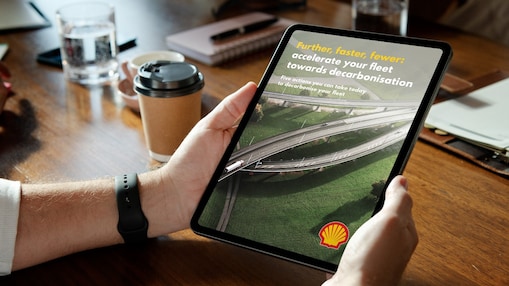
Decarbonising your fleet: five actions you can take today
From transporting goods and raw materials to delivering food and medicine and more, demand for freight transport is growing all the time. But so too is the pressure on heavy-duty fleet operators to reduce their carbon footprint. This new snapshot report outlines five steps you can take to decarbonise your fleet now.

Further, faster, fewer: accelerate your fleet towards decarbonisation.
To meet the International Energy Agency's Net Zero Scenario, the heavy-duty fleet industry must reduce its carbon emissions by 16% by 2030 relative to current levels. From digital technologies to alternative fuels, collaborative models to emissions programmes, discover a range of rollout-ready solutions for accelerating your decarbonisation journey.
Key Highlights
Created by Shell advisors, our snapshot report considers the key challenges that heavy-duty fleet operators face in navigating the energy transition and provides a five-step roadmap for your business towards a more sustainable future.

Heavy-duty fleet operators
Heavy-duty fleet operators know they must decarbonise but cite various barriers to doing so. These range from difficulty in maximising new technologies to not knowing which sources of information to trust.

Adopting new digital tools
By adopting new digital tools, products and approaches today, heavy-duty fleet operators can overcome these barriers and accelerate the journey to net-zero.

Choosing the right fuel
Simply by choosing the right fuel, heavy-duty fleet operators could cut their carbon emissions by as much as 85%.
Thomas De Boer, VP, CRT"The demands on heavy-duty fleet operators have never been greater. On one hand, they must meet the world's rising freight transport needs but on the other, they must accelerate towards net-zero. While there is no silver bullet for decarbonising, this snapshot report shows that a number of rollout-ready solutions exist. By using them to deliver immediate, incremental progress today, heavy-duty fleets can deliver seismic results tomorrow – both for themselves and for the industry as a whole."


